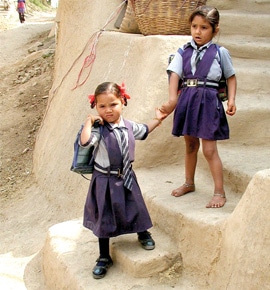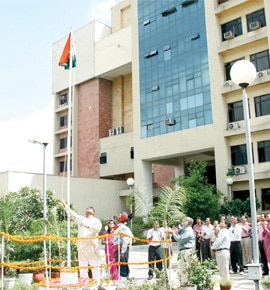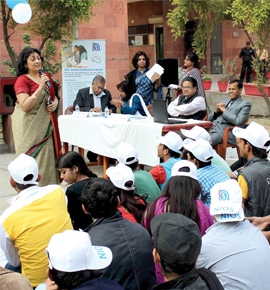
With an aim to provide education to the doorsteps of deprived, National Institute of Open Schooling (NIOS) has made it flexible for students to complete their education in the comfort of their home
 The National Institute of Open Schooling (NIOS) was started as a project on ‘Open Schooling’ under the Central Board of Secondary Education (CBSE) in 1978. It had two objectives and one of them was that the school education in India was too straight jacketing. So, there has to be flexibilities for those who didn’t want to study mathematics or science because they found it going tough as they did not have the aptitude for it. However, they were forced to study and had no option. So, the first objective of NIOS was to give them options. As it would be chaotic if it is done in regular board, so project was set up for NIOS.
The National Institute of Open Schooling (NIOS) was started as a project on ‘Open Schooling’ under the Central Board of Secondary Education (CBSE) in 1978. It had two objectives and one of them was that the school education in India was too straight jacketing. So, there has to be flexibilities for those who didn’t want to study mathematics or science because they found it going tough as they did not have the aptitude for it. However, they were forced to study and had no option. So, the first objective of NIOS was to give them options. As it would be chaotic if it is done in regular board, so project was set up for NIOS.
The second concern of the Ministry of Human and Resource Development at that time was that there’s a huge resource in our population which has never completed its education due to various reasons. The crux of it all was that people had to engage in economic activities and they had no time to go to school. Girls were kept away from school because of family responsibilities. Since there were so many children to look after, parents were engaged into a manual labour and there had to be someone at home and it ware only the girls who had to forego their education.This was actually affecting the country’s economy.
So, these people had to be educated and there was no other way for them to attend the school and schools were just not able to take them in. The Boards had their own limitations. They had the bylaws which did not permit children beyond 14 years to enter the education system. So, NIOS was the alternative created for the other side of the population to complete their education.
For 10 years it went on as a project, and was very successful. Going for the numbers which enrolled, NIOS was converted into an autonomous body by an active Parliament and became autonomous in 1989. That time it was the National Open School and it took immense hard work to consolidate the presence all over the country.
NIOS has entered into an MoU with 6000 schools, all over the country calling these as their study centres. NIOS also has its presence in the Middle East where a number of NRIs are going for Indian education
Working Model
The basic model on which NIOS worked on is the resource sharing model. What NIOS believe is that there are many schools on the ground which are being set up with the physical infrastructure, which is further determined by some by laws of State Board education or the Central Board of education. All schools are affiliated to Board of education. They laid out the norms for school infrastructure, appointment of staff, qualification of the staff for secondary and senior secondary level, and only then the school is affiliated to the Board
Since these Boards are doing so much of work and have their criteria in place, after 4 o’Clock this infrastructure is used by NIOS to fulfill the educational needs of other people who cannot attend regular schools. NIOS is motivating the teachers to do some voluntary works with very little remuneration to help out that class of learners who cannot go to regular schools but are willing to learn.
NIOS has entered into an MoU with certain schools and call these as their study centres. These are about 6,000 in number all over the country. NIOS also has its presence in the Middle East where lot of NRIs are going for Indian education.
NIOS operates through these study centres. The entire admission process is online. Anyone sitting anywhere can take admission. If someone doesn’t have access to internet, there are study centres with easy access and one can take an offline form and the study centre will put in the information of the candidate online. Admission is given for five years to the students. The students who enrolled with us can give the examination in every six months in any subject the student is learning. At the end of the five years the students have to clear five subjects and the certificate is issued thereafter.
Languages and Mediums
NIOS offers 17 Indian languages at the secondary level, eight languages at the senior secondary level and they have eight mediums at secondary level and six at senior secondary level. Currently, NIOS is focusing on Gujarati medium as there is a huge demand for it at the senior secondary level. There are a lot of students who want to study in vernacular languages and NIOS is facilitating education projects in whatever way they can, to make these youth industry ready.
Open Basic Education

The students can write the exam in any language. NIOS is working significantly in the area of Open Basic Education (OBE). It has tied up with NGOs of enrolling the children, educating them and NIOS will also give the course outline to these NGOs. It further gives the guidelines for preparing the question paper to evaluate the competencies of the children. The NGOs evaluate the answer sheets and send the marks to NIOS, on the basis of which it then gives certificates to these children. The certification is done at three levels namely A, B and C level, which is actually equivalent to class III, V and VIII level. Open Basic Education is for 6-14 age group of children. MHRD is going cautious about it because the government has already made a provision through Right to Education Act by which they say that every child of school going age must be in school, irrespective of the class for which the age is suited.
The OBE programme envisages schooling by providing a learning consortium based on graded curriculum ensuring quality of education for children, neoiterates, school drop-outs, left-outs and NFE completers. For implementation of the OBE programme, NIOS has forged a partnership with about 690 agencies providing facilities to them as study centres. The NIOS provides resource support (such as adaptation of NIOS model, curricula, study materials, joint certification, orientation of resource persons and popularisation of OBE to the voluntary agencies and Zila Saksharta Samities for implementation of its OBE programme.
Enrichment is also provided to the learners through the half yearly magazine ‘Open Learning’. The On-Demand Examination System (ODES) is in operation at Secondary and Senior Secondary stage. There is also a provision where learners can take 1 out of 10 vocational subjects at Secondary stage and 1 out of 20 vocational courses at Sr. Secondary stage in combination with academic subjects. Vocational Educational Courses are imparted through a network of Accredited Vocational Institutes for imparting skill – based training to its learners. The existing institutions like, Jan Shikshan Sansthans, Krishi Vigyan Kendras, Schools, Colleges, District Institutes of Education and Training (DIETs), Universities, Paramedical Training Centres, NGOs and several other Voluntary agencies are partnering with NIOS in imparting Vocational education.
Adolescence Education Programme (AEP)
AEP is a collaborative programme of NIOS under the MHRDUNFPA supported initiative. National Curriculum Framework (NCF)- 2005, outlines that education should instill ‘independence of thought and action, sensitivity to others’ well-being and feelings, learning to respond to new situations in a flexible and creative manner, predisposition towards participation in democratic processes, and the ability to work towards and contribute to economic processes and social change.’ AEP works in the following areas:
Curricular Intervention
Capacity Building Workshops
Mitra: The Adolescent Friendly Centre
Seminar
Summer Internship Programme
Curricular Interventions: One of the major challenges for open and distance education system is to bring the benefit of hidden curricula and the nurturing environment of a school to the learners. The innovative pilot to integrate life skills in selected lessons from Home Science, Social Science, Science and Technology and Languages (Hindi and English) at Secondary level logically concluded in the year 2009. After the overwhelming results of the pilot, the task of integration was extended to the entire curriculum of these subjects. The endeavours of last three years culminated in the publishing of life skills enriched study materials which were made available to the 7,88,347 learners of academic year 2012-13 who will be benefitted through this material. Consistence efforts were made to address the apprehension of the various stakeholders and to enhance capacities of subject coordinators and lesson writers. These initiatives have resulted in a rich resource pool of professionals trained in curricular intervention to further extend this kind of initiatives to other levels. AEP unit also ensured that the Question Banks and Tutor Marked Assignments developed in these five subjects include items that are of higher order thinking skills and test life skills.
Capacity Building Workshops: It is a conceptual approach to development that focuses simultaneously on under- standing the obstacles that inhibit people and organisations from realising their development goals while enhancing the abilities that will allow them to achieve measurable and sustainable results. Three workshops were organised during year 2012-13, one each in Bhubaneswar, Jaipur and Korapur. 125 tutors/coordinators were oriented in these workshops.
Mitra – The Adolescent Friendly Centre: Set up as a pilot intervention in the year 2010 to provide adolescent – friendly space within the NIOS regional centre in Bhubaneswar, Odisha, Mitra addresses the issues and concerns of adolescents with an objective of developing learners’ potential through various strategies of Life Skills Education. Twelve programmes were organised during the year for engaging learners and 744 learners participated in all.
One of the major challenges for open and distance education system is to bring the benefit of hidden curricula and the nurturing environment of a school to the learners
Seminar on Life Skills Integration in Open Schooling: Towards Holistic Education
A two-day seminar Life Skills Integration in open Schooling: Towards Holistic Education, was organised on December 26 and 27, 2012, at the India Habitat Centre. The seminar Chair person was Dr S.S. Jena (Chairman, NIOS) and the seminar Director was Dr. Kuldeep Agarwal (Director, Academic, NIOS).
Summer Internship Programme
Adolescence Education Programme (AEP) at NIOS has been organising the one month Certificate Internship Programme once in a year for last two years. Interns are selected from the people who are nominated by their institutions and colleges and they are also provided with the stipend.
NIOS on Web

Internet and Web Technology have proved effective in the teaching and learning process, especially in the field of Open and Distance Education. Information about NIOS is available on its website www.nios.ac.in
The learning process in NIOS is based on the needs of individual learner and the characteristics of a learning community. Open learning gives the learner control over what, where, when and how they learn. The focus of attention is the learner and the learning process. Elimination of fixed time (daily classes) and a fixed space go in favour of disabled learners and has been proved to be most suitable learning strategies for them.
Being an institution in Open and Distance Learning, ICT is being used as a major strategy towards reaching the unreached and providing the quality support to NIOS learners, especially to persons with disability. The NIOS has its own web portal www.nios.ac.in for dissemination of information and for providing online citizen – centric services as a major initiative of e-Governance. The NIOS online project has brought convenience to its learners, client group, and transparency in the basic operations of NIOS in the area of admission, examination and accreditation and enhanced the quality of the support services to its learners.
The admission process in NIOS is 100 per cent online due to which the content of the NIOS website has to be learner friendly, simple and accessible to learners. The website provides complete information about NIOS with rich content and designed by following the GIGW including guidelines of WCAG.
National Consortium for Open Schooling (NCOS)
The National Institute of Open Schooling (NIOS), which has emerged as the largest Open Schooling system in the world, has a pivotal role to play in the promotion and development of Open Schooling in the country. However, it is not possible for NIOS alone to cater to the needs of all regions of our multilingual and multicultural country (India). The Open Schooling system is required to be promoted and strengthened in all the States of the country to “reach the unreached”. NIOS has, therefore, been pursuing the State Education Departments to set up State Open Schools (SOSs).The NIOS has been providing professional and technical support services to States to set up State Open Schools to cater to the educational requirements of the clientele/students.
With a view to systematise interaction and mutual consultation among the Open Schools at national level (NIOS) and at State level (SOSs), it was considered appropriate to establish a Consortium of Open Schools.
The National Consortium for Open Schooling (NCOS) was launched in September 1997, with a view to facilitate better cooperation, coordination, collaboration and determining standards in Open and Distance Learning (ODL) system at school education level in the country. The Secretariat of NCOS is located in NIOS. In order to meet the educational challenges, the Framework of NCOS has been modified.
COMOSA
The COMOSA is a non-profit, democratic, collaborative and futuristic organisation based on mutual respect and committed to support the efforts of open schooling institutions. The basic objective of the association is to cooperate and collaborate in development, promotion and introduction of innovative, high quality, relevant, equitable, gender-sensitive and cost- effective programmes of school education for sustainable development in commonwealth countries through Open and Distance Learning Mode, and thereby targeting to achieve the Millennium Development Goals (MDG) of the United Nations.
The Chairman, National Institute of Open Schooling (NIOS), India (Dr. S. S. Jena) has been elected as the first Chair- person of the COMOSA in its general Body Meeting held on November 25, 2009. It was also resolved by the members of COMOSA to have its first Secretariat located at NIOS Campus.
Prof. D. B. Gupta from the State Open School, Jammu and Kashmir (India) has been elected as the Treasurer of COMOSA. As resolved by the COMOSA members, a joint account for COMOSA is to be opened in Jammu and Kashmir to be operated by the Chairperson and the Treasurer of the Association. The COMOSA Secretariat is taking necessary action for registration of COMOSA in India as per the law of the country.






















